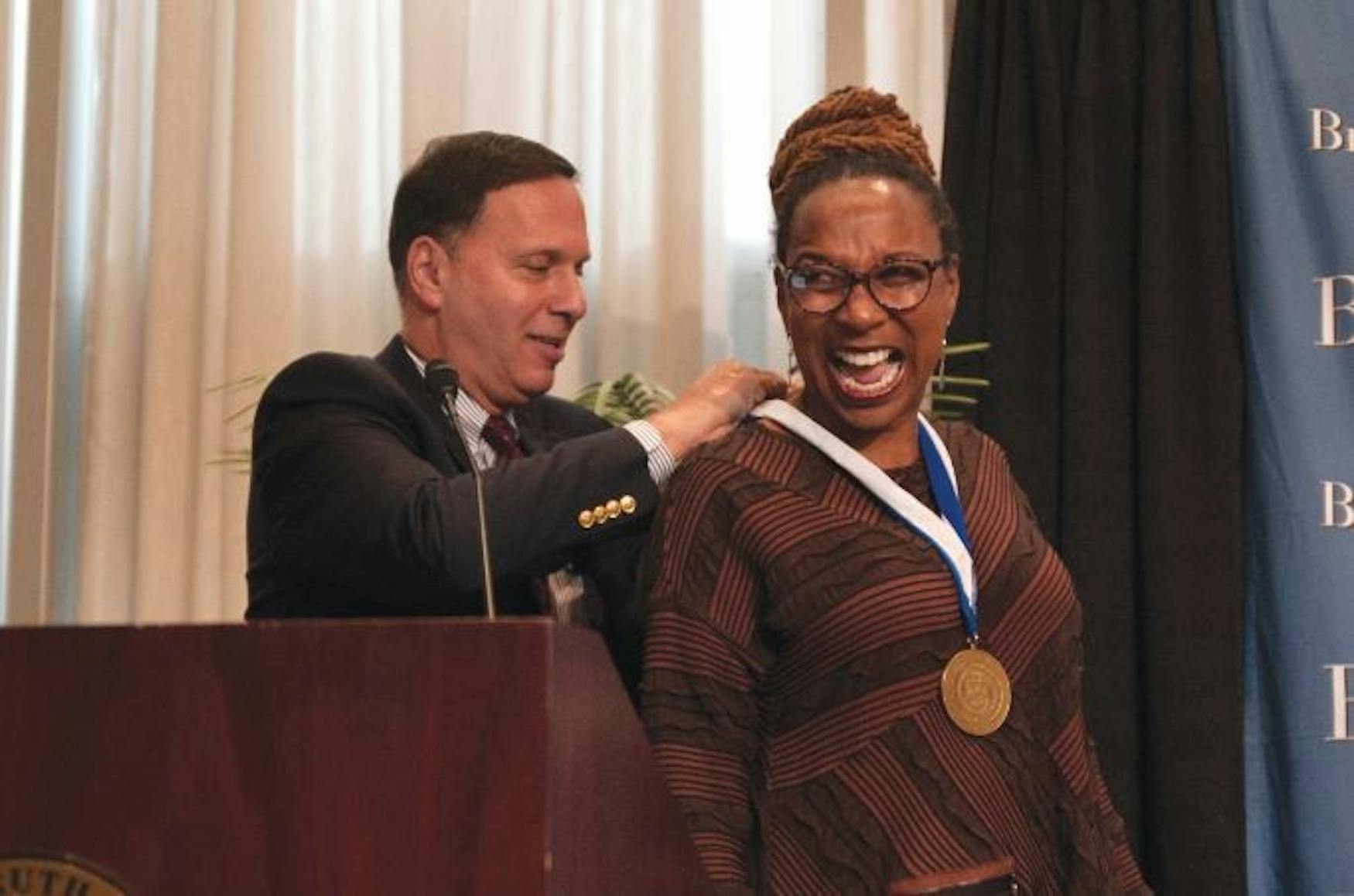Kimberlé Crenshaw accepts Gittler Prize for career works
In recognition of her scholarly work in intersectionality and critical race theory, the University awarded Kimberlé Crenshaw the Joseph B. and Toby Gittler Prize last Wednesday.
After three days of events celebrating Kimberlé Crenshaw’s scholarly works, University President Ron Liebowitz presented Crenshaw with the award at a ceremony and lecture on Wednesday.
The University of California, Los Angeles and Columbia Law School professor and co-founder of the African American Policy Forum was recognized for her “exemplary scholarship” and “lasting impact in the world” with her theory of intersectionality and critical race theory, according to Prof. Elizabeth Ferry’s (ANTH) introduction. In her Prize Lecture, “Race, Reform, Retrenchment Redux: Critical Race Theory and Intersectionality Beyond Post-Racialism,” Crenshaw defended that theory of intersectionality and argued for the necessity of remembering, recognizing and elevating the voices of Black women.
Crenshaw explained her theory of intersectionality with a curious image: a long, narrow photo of cows grazing on grass. Telling the audience the cows were sick, she asked them who they would blame; the audience found the farmer guilty. However, she then uncovered the top of the picture, revealing a massive cloud of industrial smoke — the real reason the cows were sick.
“There are all kinds of attributional errors which happen when you see a problem … in a narrow frame,” Crenshaw said. “When you broaden the frame, you have … a capacity to see not only the problem with respect to the cows, but the problem with respect to all of us: who is responsible, and what needs to be done.”
Intersectionality is that broad frame which allows people to see problems as institutional rather than individual so that real solutions can be found, according to Crenshaw.
The necessity of this new frame was made clear in the 1980s when Black women were clearly being discriminated against in hiring practices but were losing discrimination suits, according to Crenshaw. Because the businesses in question hired Black men and white women, courts ruled that no gender or race discrimination was occurring, and they rejected the idea that Black women could sue for both simultaneously.
“So the objective of intersectionality was to try to explain to judges what they were missing,” Crenshaw said. “It is basically an idea that social forces overlap: race, gender, sexuality, gender identity, disability and more.”
Although it has become a pillar of sociological thought since Crenshaw coined the term in 1989, intersectionality is often attacked today for being a divisive ideology that causes problems instead of solving them.
In her lecture, Crenshaw defended intersectionality against those who seek to displace conversation by criticizing the frame instead of looking through it. She countered this refusal to recognize the problems intersectionality illuminates by focusing on the overlooked struggles of Black women.
Crenshaw declared that a “racist patriarchy” has shoved Black women out of the political sphere, erased their history and treated them as afterthoughts — and has gone uncontested even by marginalized communities and allies.
For Crenshaw, a pinnacle of this phenomena was seen when Anita Hill accused now-Supreme Court Justice Clarence Thomas of sexual harassment during his confirmation process in 1991. According to Crenshaw, sexual harassment was seen as a “white woman’s hang-up,” and members of the Black community turned against her for being a liar and a “traitor” to their race.
The support Thomas received as a reaction against Hill led to his confirmation, Crenshaw argued. Thomas would go on to be the fifth vote in the two 5-4 rulings of Citizens United v. FEC (2010) and Shelby County v. Holder (2013), which gutted campaign finance laws and the Voting Rights Act, respectively, and paved the way for President Donald Trump’s election, according to Crenshaw.
Here Crenshaw sees a perfect example of what she calls “intersectional failure.” These are moments when communities and allies themselves fail to stand up for those facing intersecting marginalizations.
Crenshaw argued that the “historical amnesia” surrounding Black women’s history further contributes to the racist patriarchy. She drew attention to the activist organization founded by Recy Taylor and Rosa Parks — the foundation of the Montgomery Bus Boycott — but which itself has been forgotten. This is an example of the way “the quiet, courageous and often thankless work of Black women” is erased and overshadowed, Crenshaw said.
The dismantling of the racist patriarchy therefore requires communities to remember forgotten history and to advocate for all of their members instead of some, even “at risk of being told we’re not good allies, just because we insist on justice for all.”
Crenshaw argued that allies must elevate the voices of Black women to help break the “cycle of invisibility” created when Black women cannot vocalize the problems they face.
In the middle of her lecture, Crenshaw left the audience with a challenge wherein her solution lies: “What happens when we actually take the time not just to spout about intersectionality, but to actually do intersectional work? To actually create the spaces for people to actually talk about what’s falling through the cracks?”




Please note All comments are eligible for publication in The Justice.